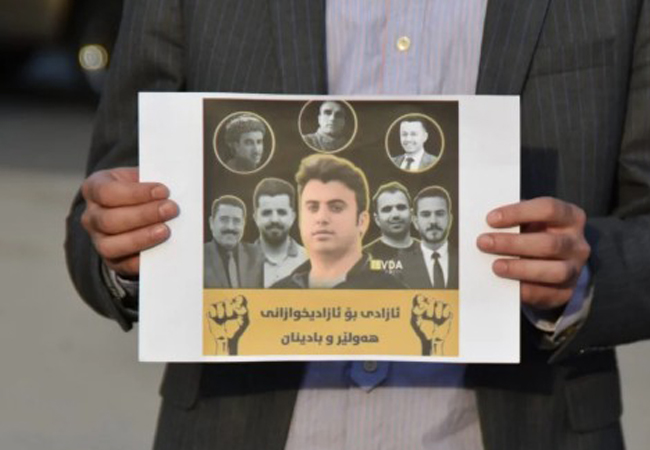Journalist Sherwan Sherwani appeared before the Erbil Investigation Court of Investigation on another case related to "threatening" an officer inside the Erbil Rehabilitaion Facility, according to Sherwani’s lawyer.
The freelance reporter Sherwan Sherwani was arrested in 2020 and convicted guilty of disturbing national security of Iraqi Kurdistan Region IKR by Erbil criminal court on February 16, 2021, for six years in prison along with four other freelance reporters and civic activists among over 80 detainees of Badinan (Duhok province).
The president of Iraqi Kurdistan Region IKRP per his power has reduced the conviction sentence for five of Badinan detainees from six years to two years and half, expected to be released last September.
However, the local authorities of the IKR have decided in February 2022 to punish one of Badinan detainees included in a presidential decree for reduction of sentence by 60% by reducing his sentence only 50% following his comments of defiance.
"Another case has been opened against journalist Sherwan Sherwani and he has been brought to the Erbil Investigation Court in Kesnazan on Sunday," Bashdar Hassan, a member of the team of lawyers defending activists in Badinan, said in a statement on April 16, 2023.
"On June 23, 2022, Sherwan Sherwani allegedly threatened a Zeravani (Peshmerga) officer inside the Erbil Rehab Center, and another investigation was opened against him at the Kesnazan police station, according to Article 229 of the Iraqi Penal Code," he added.
“Sherwan was brought before the judge of the Erbil Plains Investigation Court in Kesnazan on Sunday, but because neither Sherwan nor his lawyers were aware of the case, he refused to be interrogated and the judge postponed the hearing.”
“He is to be questioned in the presence of his lawyers in another session.”
Article 229 of the Iraqi Penal Code provides for assaults on civil servants on official duty, punishable by up to three years in prison.
In October 2020, Sherwan Sherwani and four journalists and activists from Badinan were arrested and sentenced to six years in prison on February 16, 2021 by a majority of judges of the Erbil Criminal Court.
On March 16, 2023, three of the convicts in Badinan were released after completing their sentences and reducing their sentences according to a presidential decree, including (Ayaz Karam, Shivan Saeed and Hariwan Isa). However, Sherwan Sherwani and Gohdar Mohammed are still in prison and other cases have been opened against them.
Badinan detainees, few of them tried and freed up today, are victims of a wave of arrests carried out by the Kurdish security forces Asayish since June 2020 in response to a series of major protests against delay in salaries of state employees, the KRG handling of the economic crisis resulting from disputes with Baghdad over oil production, export and corruption, and reached its peak under the Covid-19 pandemic.
The charges are based on Law 21 approved by parliament of Kurdistan, Iraq, in 2003 which revoked item 156 of Iraq penal code stating that "any one purposefully in any means involved in an action that harms security, stability and sovereignty Iraqi Kurdistan region's institutions and causes damage will face life imprisonment or short-term imprisonment."
Saddam Hussein regime used to repress opponents per this law especially the key opposition Kurdish parties of Kurdistan Democratic Party KDP and the Patriotic Union of Kurdistan PUK, currently leading the KRG.
On April 14, Hassan issued a statement saying that "they have created a new charge against the convict (Sherwan Sherwani) allegedly instead of the convict (Guhdar Zebari) fingerprinted a request to transfer them from Erbil to Sulaimaniyah.”
"The prisoners in Badinan had agreed to agree on any decision related to their case and in case of punishment and separation and disagree on any issue, they have the same decision and can make decisions instead of each other," he added.
The defense lawyer denied any crime or misdemeanor by his plaintiffs.
“From a legal point of view, the crime of fraud consists of three main pillars: material, moral and harm. In this case, there is no harm. Sherwan has not caused any harm to the public interest,” he explained.
“He did not forge any official documents or letters, nor did he harm anyone's interests. On the contrary, Sherwan's actions were in the interests of his friend and he had previously allowed him to do this.”
While emphasizing that the work of the correctional administration has become a big problem, it was a simple letter, not an official letter, to the extent that there was no official stamp on the letter.
Hassan pointed out that Gohdar Zebari himself told the member of the prosecutor general and the special judge that they had previously agreed to decide instead of each other and agree on any issue that is in their interest and has no problems with the fingerprint. Besides, he has not complained about the issue.
The independent commission for human rights in the IKR recorded arrest of 300 people from August to October 2020 for "organization of protests and disorder,” mainly in Duhok northern province. More than 50 are still in prison.
The KRG has sent over 50 activists and journalists to court in 2020 and 2021 and some of the cases are still pending at court awaiting trial.
The court verdict against Badinan detainees sparked wide protests as Iraqi and international media outlets and organizations, human rights advocates & MPs expressed their grave concern that that press freedom is increasingly under threat in the IKR.
Local and international media organizations, journalists, civil society activists and lawmakers condemned the conviction as a restraint of freedom of press and expression as the penal code was used as means of suppression by Saddam Hussein totalitarian regime for decades against the opposition parties including the Kurdistan Democratic Party KDP and its partner Patriotic Union of Kurdistan PUK, the tow key political parties chairing the KRG and ruling IKR.





